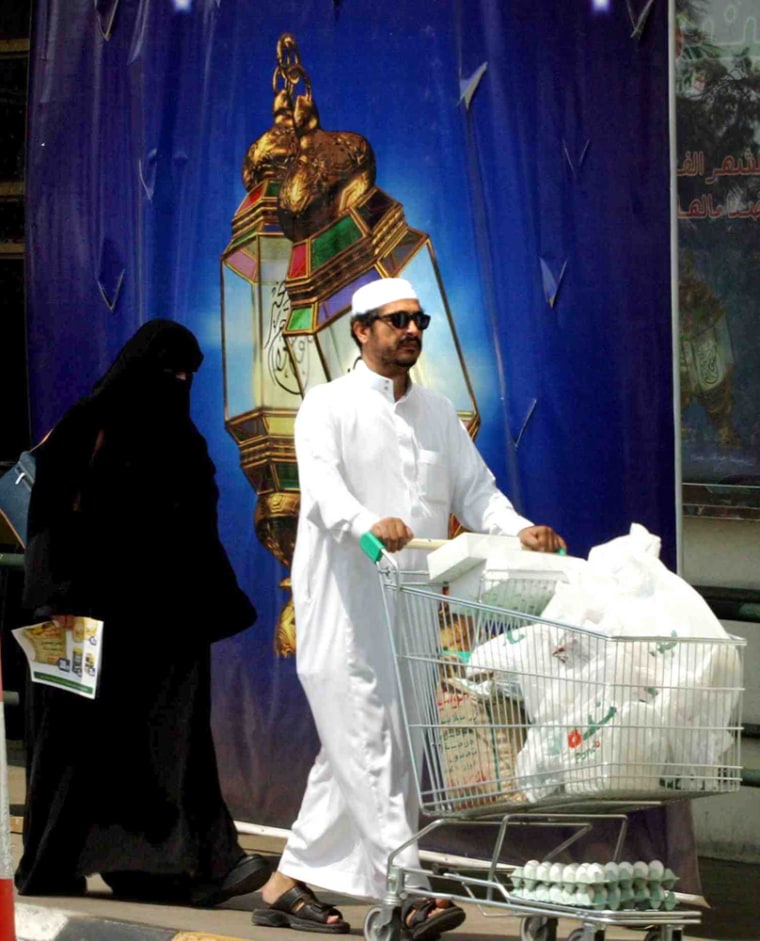Women may neither vote nor run in Saudi Arabia’s first nationwide elections, the government announced Monday, dashing hopes of progressive Saudis and easing fears among conservatives that the kingdom is moving too fast on reforms.
Some women considered the move yet another indignity in a country where they need their husbands’ permission to study, travel or work. But others said they wouldn’t trust themselves to judge whether a candidate is more than just a handsome face.
The religious establishment had been lobbying against women’s participation in the elections, diplomats said.
But an electoral official cited administrative and logistical reasons Monday for the decision to ban women from the municipal elections, scheduled to be held in three stages from Feb. 10 to April 21.
The official, who spoke on condition of anonymity, said there are not enough women to run women’s-only registration centers and polling stations, and that only a fraction of the country’s women have the photo identity cards that would have been needed to vote.
Reservations over unveiled faces
Many women in Saudi Arabia, the birthplace of Islam, have balked at getting the ID cards — introduced three years ago — because the photographs would show their faces unveiled.
Saudi women have limited freedoms. Without written permission from a male guardian, they may not travel, get an education or work. Regardless of permissions, they are not allowed to drive, mix with men in public or leave home without covering themselves with black cloaks, called abayas.
The decision was first announced by Interior Minister Prince Nayef in an interview published Monday. In his terse comment to a Kuwaiti newspaper, Nayef said only: “I don’t think that women’s participation is possible.”
His remark was the first by a named top official on the issue. It settled a question that had been occupying Saudis since the government set the date for the elections in August. When the election law was published, it did not explicitly bar women from voting, which encouraged three women to declare themselves candidates.
“I am surprised,” said Nadia Bakhurji, 37, the first woman to announce she planned to run. “I was optimistic and didn’t think they would ban it.”
Bakhurji said she hoped Nayef and the elections committee would “rethink their decision” and show transparency by saying why women have been banned.
She said that would give women the chance to “work hand-in-hand with them to solve these problems in time for elections,” said Bakhurji, an architect and a mother of two.
“My concern is, if they don’t bring us on board now, we will be fighting for something that should be a given right,” she said.
Saudi women disagree
Not all Saudi women agreed. Taking a break from shopping at the food court of a Riyadh mall, Nour Ahmed and her five female friends split evenly on the issue.
“Women are capable of voting and making the right choices,” said Ahmed, a 22-year-old marketing graduate. “Why aren’t men and women equal in this issue?”
“We aren’t,” countered her friend Sarah Muhammad. “We have so little interaction with men that we will vote with our emotions, choosing candidates for their looks and sweet talk rather than for what they can deliver.”
Rima Khaled, 20, said Saudi women are not used to playing a role in public life, and many social and traditional restraints should first be removed before they can.
“What’s the point of voting?” she asked. “Even if we did vote, we would go home to the men in our lives who will have the last say in whatever we do.”
Sparse electoral history
Saudi Arabia’s only electoral experiences were some municipal polls held in a few cities in the 1960s. They did not cover the whole country, and their electoral rules and registration procedures did not conform to international standards. Women did not vote.
Registration for the new elections begins in November. Voting will start Feb. 10 around the capital, Riyadh. Voting in the eastern and southwestern regions will follow, starting March 3. Voters in northern parts of the country will go to the polls April 21.
The elections are part of the government’s measured response to calls for political and social change. Saudi Arabia is an absolute monarchy with an unelected Consultative Council, which acts like a parliament. Political parties are banned, and press freedoms are limited.
The Sept. 11, 2001, attacks on the United States spurred calls for the Saudi royal family to modernize the country’s political landscape. Fifteen of the 19 hijackers involved in Sept. 11 were Saudis.
